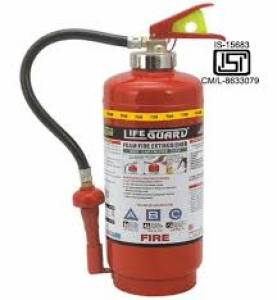Description
WATER TYPE FIRE EXTINGUISHERS: Your First Line of Defense Against Common Fires
Water type fire extinguishers are a crucial part of any fire safety plan, providing an effective and economical solution for combating Class A fires. These extinguishers are ideal for homes, offices, schools, and other locations where the risk of common combustible materials catching fire is present. Understanding their capabilities and limitations is key to safe and effective use.
What are Class A Fires?
Class A fires involve ordinary combustible materials like wood, paper, cloth, rubber, and many plastics. These materials burn readily and leave behind embers that can reignite. Water extinguishers excel at extinguishing these fires by cooling the burning material below its ignition temperature.
How Water Extinguishers Work:
Water extinguishers utilize pressurized water to disrupt the combustion process. The water absorbs heat, cooling the burning material and preventing further ignition. The fine mist produced by many modern water extinguishers increases the surface area for heat absorption, enhancing effectiveness.
Types of Water Extinguishers:
- Pressurized Water Extinguishers: These are the most common type, relying on compressed air or nitrogen to propel the water. They are simple to use and relatively inexpensive.
- Water Spray Extinguishers: These deliver water in a fine mist, increasing effectiveness and reducing the risk of water damage to surrounding areas. They are particularly useful for delicate equipment or where water damage needs to be minimized.
Advantages of Water Extinguishers:
- Cost-Effective: Water extinguishers are generally less expensive than other types of extinguishers.
- Easy to Use: Their simple operation makes them suitable for untrained personnel.
- Effective on Class A Fires: They are highly effective at extinguishing common combustible fires.
- Environmentally Friendly: Water is a non-toxic extinguishing agent.
Limitations of Water Extinguishers:
- Ineffective on other fire classes: Never use a water extinguisher on Class B (flammable liquids), Class C (electrical fires), or Class D (combustible metals) fires. Doing so can be extremely dangerous and may spread the fire.
- Water Damage: While water spray extinguishers minimize damage, using a water extinguisher can still cause water damage to property.
- Electrical Shock Hazard: Using a water extinguisher on an electrical fire can result in serious injury or death due to electrical shock.
Choosing the Right Water Extinguisher:
The size and type of water extinguisher you need will depend on the specific risks in your location. Consider the following factors:
- Size of the area to be protected: Larger areas require larger capacity extinguishers.
- Type of materials present: The risk of Class A fires will determine the suitability of a water extinguisher.
- Accessibility: Ensure extinguishers are readily accessible and clearly visible.
